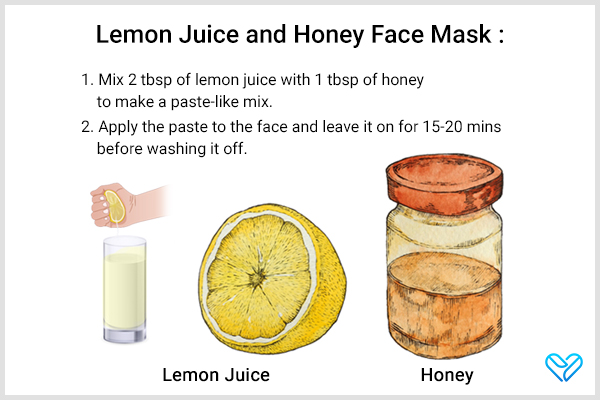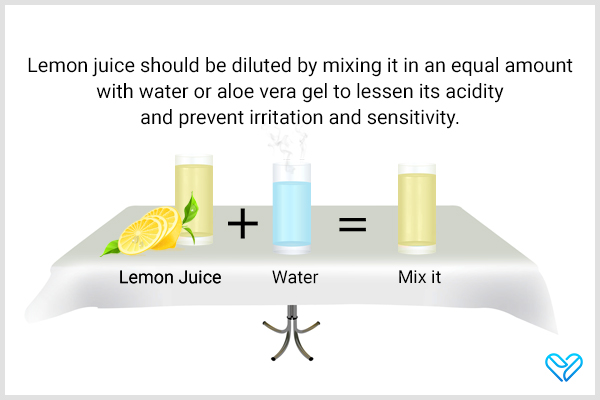In this article:
Lemon, the citrus fruit many people love, not only is a great flavoring agent to dishes but also offers numerous health and beauty benefits. It is rich in vitamin C, antioxidants, and citric acid, which make it an effective natural ingredient for treating various skin issues.

One of the most familiar skin concerns in dermatology is oily skin, which is caused by the excessive production of natural oils by the sebaceous glands, which can further cause acne breakouts, plugged-up pores, and blackheads. Lemon can potentially be a useful ingredient for oily skin. (1)(2)(3)(4)
This article will explore how and why you should use lemon on oily facial skin.
DIY Lemon Masks for Oily Skin
Here are some quick homemade masks using lemon that you can incorporate into your skin care routine.
1. Lemon juice and egg white face mask
A study found that a diet high in protein, including eggs, was associated with lower sebum content in individuals with oily skin. This is because eggs contain amino acids that help to regulate sebum production, thus reducing the likelihood of clogged pores and acne breakouts. (5)
How to use:
- Separate the white part of an egg from its yolk and whisk it to make it fluffy/frothy.
- Put in 1 tbsp of lemon juice and blend them nicely.
- Apply the mixture to your face and let it sit for 15–20 minutes.
- Wash it off.
2. Lemon juice and honey face mask

A study found that honey can be beneficial for individuals with oily skin. Honey has innate antibacterial activity that can aid in the prevention of acne breakouts. It is also a natural humectant, which helps to lock in moisture without clogging the pores.
Moreover, honey contains antioxidants and anti-inflammatory agents that can assist in the reduction of inflammation of the skin and provide a soothing effect.
All-in-all, honey can be an incredible ingredient to add to your skin care regimen, especially if you have oily skin and you want to prevent acne and maintain healthy, hydrated skin. (6)(7)(8)
How to use:
- Mix 2 tbsp of lemon juice with 1 tbsp of honey to make a paste-like mix.
- Apply the paste to your face and let it sit for 15–20 minutes.
- Wash it off.
Precautions When Using Lemon on the Skin
When used in high concentrations, lemon juice and its extracts may have irritating effects, according to a review of the chemistry and pharmacological aspects of lemon.
The increased photosensitivity caused by applying lemons to the face is another disadvantage. Lemon juice makes the skin more susceptible to UV radiation since it contains photosensitizing substances such as psoralens.
Thus, after applying lemon juice or any other citrus juice to the skin, it is best to avoid being in the sun (9) and to apply a broad-spectrum sunscreen with an SPF of 30 or higher.
How to Safely Apply Lemon to the Face
Follow these steps to safely apply lemon on your face:

- To lessen its acidity and prevent irritation and sensitivity, dilute lemon juice by mixing it with an equal amount of water or aloe vera gel.
- To help the lemon juice penetrate the skin better, wash your face well with warm water and a mild cleanser to remove any dirt or makeup.
- Dip a cotton ball in the diluted lemon juice mixture, and gently apply it to your face, avoiding the eye area.
- Leave the lemon formulation on the skin for no longer than 5–10 minutes.
- Thoroughly rinse your face with cool water.
- Apply a moisturizer and then sunscreen with an SPF of at least 30.
Always remember to perform a patch test on your skin before using any new product, especially if you have sensitive skin. If you experience any unpleasant effects, stop using the product right away.
How Can Lemon Be Useful for Oily Skin?
The benefits of lemon for oily skin are as follows:
- Supplies vitamin C: Lemons are a great source of vitamin C, which is essential for maintaining the health of all skin types, including oily skin.
- Provides powerful antioxidants: Vitamin C acts as a potent antioxidant, protecting the skin from free radicals and environmental stressors, which can contribute to signs of aging such as fine lines and wrinkles. (1)(2)
- Regulates oil production: Lemon helps control the production of natural oils by the skin. This is important for oily skin as it helps prevent excessive oiliness and reduce the likelihood of clogged pores. (4)
- Balances skin tone: Lemon has natural astringent properties that can help even out skin tone and reduce the appearance of blemishes and dark spots. (4)
- Provides antibacterial actions: Lemon possesses antibacterial properties that can help inhibit bacteria on the skin’s surface, reducing the risk of acne and breakouts, which are very common in oily skin. (1)(3)(4)
- Exfoliates the skin: The acidic nature of lemon juice can have a mild exfoliating action, which is good for the removal of dead skin and unclogging pores.
Most-Asked Questions
Is it okay to apply lemon juice directly to my face?
Applying lemon juice directly to the face, especially to sensitive skin, can be potentially unpleasant. It is advised to use a product with low quantities of lemon extract or to dilute lemon juice with water.
Will lemon juice make my skin tone lighter?
Absolutely. Because lemon juice naturally bleaches the skin, it can brighten skin tone. However, because it can also make the skin sensitive and irritated, it should be used moderately and with caution. (10)
Will lemon juice damage my skin in the sun?
Absolutely. Applying lemon juice to the face might raise the risk of sun damage by increasing the skin’s sensitivity to light. After using lemon juice, it is advisable to stay out of the sun and wear sunscreen with a high SPF. (9)
How frequently should I apply lemon juice to my face?
Dermatologists advise against using lemon juice on the face more than once or twice a week to prevent skin sensitivity and irritation.
Final Word
Lemon is an effective natural ingredient for treating oily skin. Its astringent and exfoliating properties help to remove excess oil and unclog the pores. However, it is important to use lemon on the skin with caution and to do a patch test before using it on your face.
Incorporating lemon into your skin care routine can help to keep skin oiliness under control and can give you a brighter, smoother complexion.
- Was this article helpful?
- YES, THANKS!NOT REALLY


